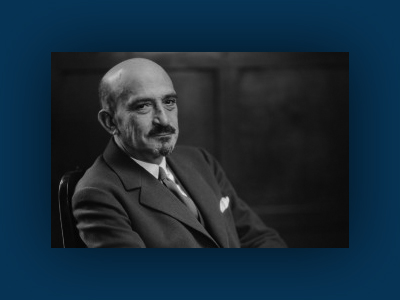
January 26, 1919
Chaim Weizmann warns that unless world Jewry secures a place of their own they will be faced by a terrible catastrophe.
During and after World War I, Chaim Weizmann emerges as the key Zionist leader seeking a Jewish National Home. Half a dozen issues vital to Zionism’s future are determined by his diplomatic engagement: presenting the case for a Jewish national home to the British government, representing the Zionist case at the Paris Peace Conference, heading the Zionist Commission to Palestine to look after needs of the teetering Jewish communities there, fostering positive relations with the Arabs in the region and in Palestine, helping to define the future boundaries of Palestine, coordinating needs for the plight of Eastern European Jewry, soliciting support for Zionism in America, and arguing the Zionist case to the British military administration in Palestine who were otherwise not favorably disposed to seeing Britain support for a Jewish national home.
Knowing that General Arthur Money, head of the British Military administration in Palestine at the time was distinctly opposed to Zionism in Palestine, Weizmann nonetheless vigorously argued the Zionist case to this key British administrator. He and Money had met a week earlier in Palestine, where their views clashed. Weizmann followed up the meeting with a letter that put the dire need for a Jewish national home in context. With uncanny foresight Weizmann wrote, “…the lessons which world Jewry has learnt in the last few terrible years has forced them to a conclusion that unless they secure a place which they may call their home in a real sense of the word, they will be faced by a terrible catastrophe. Moreover such a catastrophe would shatter not only the whole fabric of Jewish existence, but would endanger the peace and society as a whole. This is, I am afraid, an incontrovertible fact whose tragic significance is not quite clear to everybody. It was not quite evident even to myself because I had the good fortune to live and work in this country (England). It is only recently, since the veil of war has been slightly lifted, the that whole tragedy of my people has become more apparent to me, and it is their cry for help, their just claim to exist, their wish, dictated by a relentless logic of cruel facts, that I have tried to [explain.]” Money would not be persuaded by Weizmann’s articulate plea; Money left Palestine in early 1920 in favor of the newly created civilian administration headed by Sir Herbert Samuel. See Weizmann’s Letter to Money, January 26, 1919, Weizmann Letters, Vol. IX (1918-1920), pp. 104-107 and Jehuda Reinharz’s introduction to this volume.
